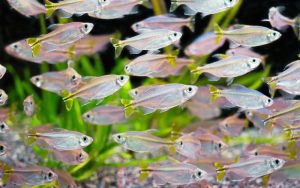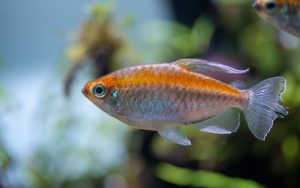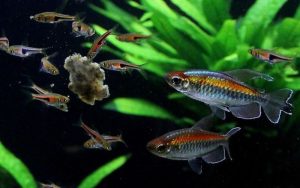Are goldfish aggressive fish? If you’re a fan of goldfish, you’ve probably come across the stunning Fantail Goldfish variety. Fantail Goldfish is a popular choice for aquarium enthusiasts with its elegant flowing tails and vibrant colors. However, a common question often arises among goldfish keepers: Why are Fantail Goldfish aggressive?
In this blog post, we’ll delve into the fascinating world of Fantail Goldfish behavior and explore the factors that can contribute to their aggression.
We’ll uncover seven major reasons that may trigger aggressive behavior in these beautiful fish and provide you with practical fixes to ensure a harmonious aquarium environment.
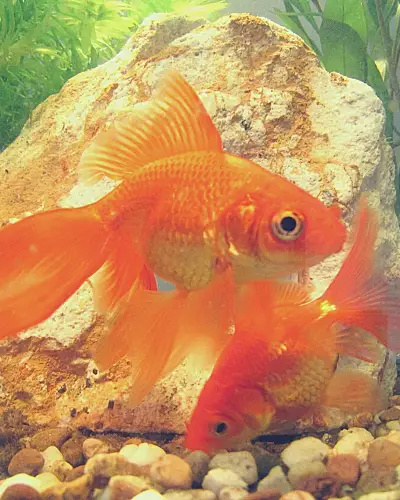
While Fantail Goldfish are generally known for their peaceful nature, there are instances where they can display aggressive tendencies.
Understanding the reasons behind their aggression is crucial for maintaining a healthy and stress-free environment for your aquatic pets.
So, keep reading if you’re curious about the potential causes of aggression in Fantail Goldfish and eager to learn practical solutions to promote peaceful coexistence.
By the end of this article, you’ll be equipped with the expertise and proper tools to create a serene and thriving habitat for your beloved Fan-tail Goldfish.
Table of Contents
ToggleUnderstanding Fantail Goldfish Behavior
Before delving into the causes and fixes for goldfish aggression, it’s essential to understand the fundamental behavior of fantail goldfish. Fantails are the type of goldfish known for their beautiful double tail, egg-shaped body, and elegant swimming style.
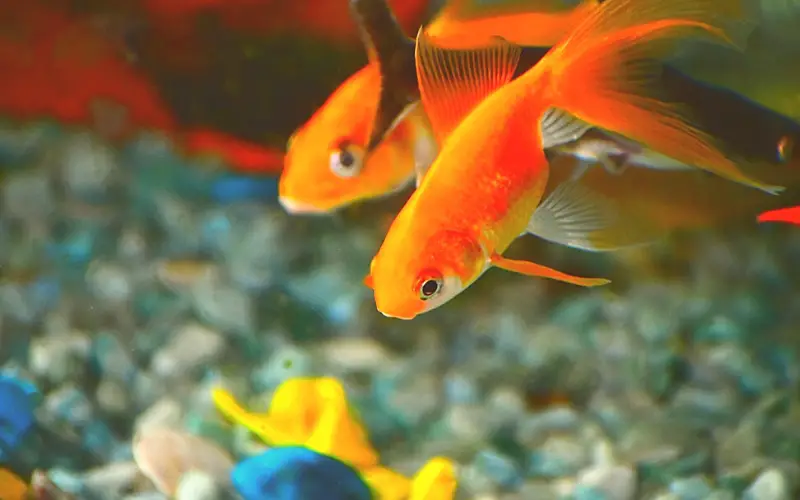
Are fantail goldfish friendly? They are generally peaceful and amiable creatures, making them popular among aquarium enthusiasts. However, under certain circumstances, they can display aggressive behavior.
It’s crucial to monitor the tank’s conditions regularly. To keep your Fantail goldfish healthy and prevent diseases, Ensure there are no detectable levels of ammonia and nitrate to avoid health problems caused by stress.
The Nature of Aggression in Goldfish
Are goldfish territorial? Aggression is expected in the animal kingdom, and goldfish are no exception.
While goldfish are generally peaceful, various factors can trigger aggressive behavior. Understanding the nature of aggression in goldfish is crucial in addressing and mitigating the issue effectively.
Are Fantail Goldfish Aggressive?
Fantail Goldfish are generally known for their peaceful nature, but they can display aggression in some instances. Understanding the reasons behind their aggression is crucial for maintaining a healthy and stress-free environment for your aquatic pets.
Here are some common causes of aggression in Fantail Goldfish and effective solutions to promote a peaceful coexistence:
7 Reasons Your Goldfish May Become Aggressive
Goldfish aggression can stem from several causes. Identifying these causes is the first step in finding appropriate solutions to promote harmony in your aquarium. Let’s explore the reasons behind aggressive behavior in fantail goldfish:
– Territorial Behavior
Goldfish, like many other fish species, can exhibit territorial behavior. They may become possessive of a particular area in the tank and become aggressive towards other goldfish or tank mates that enter their territory.
– Mating Season Aggression
If you want to breed fantail goldfish, Take care. Goldfish can display heightened aggression during the breeding season as they compete for mates. This mating behavior is particularly noticeable in male goldfish, who may relentlessly chase and nip at the female goldfish.
– Poor Living Conditions
Inadequate living conditions, such as poor water quality or overcrowding in the tank, can contribute to goldfish aggression. When goldfish feel stressed or uncomfortable in their environment, they may exhibit aggressive behavior to assert control.
– Overcrowding in the Tank
When a goldfish tank is overcrowded, it can lead to heightened competition for resources like food and territory. This competition can escalate into aggressive behavior among the goldfish as they vie for dominance.
– Lack of Food and Feeding Time Competition
Compete for food: Insufficient food or irregular feeding times can trigger aggressive behavior in goldfish. Goldfish may become more aggressive towards their tank mates when they are hungry or feel threatened during feeding time.
– Introducing New Tank Mates
Introducing new fish into an established goldfish tank can disrupt social dynamics and trigger aggression. Goldfish are territorial creatures, and the presence of unfamiliar tank mates can lead to confrontations and aggressive behavior.
– Sick or Injured Goldfish
Goldfish that are sick, injured, or in pain may exhibit aggressive behaviour as a defensive mechanism. Feeling vulnerable, they may lash out at other fish to protect themselves or assert dominance.
Recognizing Aggressive Goldfish Behavior
To effectively address goldfish aggression, it’s crucial to identify the signs of aggressive behavior. Some common indicators of aggressive goldfish behavior include:
- Goldfish chasing each other and nipping at other fish
- Flaring of fins and displays of dominance
- Your Goldfish biting other goldfish tail
- Bullying weaker or smaller fish
- Establishing and defending territories
- Frequent confrontations with tank mates
By closely observing your goldfish’s behavior, you can determine if aggression is present and take appropriate measures to address it.
aggressive goldfish types
While goldfish may not be known for their ferociousness, some varieties exhibit more dominant and potentially aggressive tendencies than others. It’s essential to manage their environment and choose tank mates carefully to avoid problems. Here are some points to consider:
Generally, aggression in goldfish boils down to:
- Space: Goldfish need ample space to swim freely and avoid feeling crowded. Cramped conditions can lead to tension and aggression.
- Competition: Overfeeding or insufficient tank resources can spark competition for food or territory.
- Individuality: Like any species, individual personalities play a role. Regardless of breed, some goldfish may be more dominant or territorial than others.
Now, on to some breeds known for their potential for aggression:
- Ryukin: With their bulbous body shape, Ryukins can be slow swimmers and easily bullied. However, they can also be quite competitive for food and space, exhibiting fin-nipping or chasing behavior towards slower or more docile tank mates.
- Oranda: Similar to Ryukins, Orandas have a compact body and prominent wen on their head, making them vulnerable to nipping. They can also be dominant feeders and bully other fish for access to food.
- Telescope goldfish: Their bulging eyes make Telescopes incredibly delicate and susceptible to injury. This vulnerability, combined with their sometimes assertive nature, can lead them to become bullies towards other fish, especially those with longer fins or tails.
- Black Moor: Like Telescopes, Black Moors have sensitive protruding eyes, making them prone to aggression from other fish. Additionally, their telescope eyes can limit their vision, hindering their ability to avoid conflict.
Remember:
- These are just tendencies, not absolute rules. Even within these breeds, individual personalities can vary.
- Proper husbandry can minimize aggression. Ensure ample space, adequate filtration, good water quality, and a varied diet to reduce competition and provide enrichment.
- Tank mate selection is crucial. Avoid pairing aggressive goldfish with slower, more delicate varieties like Fantails or Bubble-eyes. Consider calmer fish like Comets or Shubunkins as potential tank mates.
By understanding these points and choosing compatible tank mates, you can create a harmonious aquatic environment for your goldfish to thrive in.
How to Stop Goldfish Aggression?
How to stop goldfish bullying? Dealing with aggressive goldfish requires a multi-faceted approach to create a peaceful and harmonious tank environment. Here are some effective strategies to stop goldfish aggression:
– Providing Adequate Space
Ensure that your goldfish have enough space to swim and establish their territories. A larger tank with ample swimming room can help reduce aggression by minimizing competition for territory.
– Maintaining Optimal Water Quality
Regular water changes, proper filtration, and monitoring of water parameters are crucial for maintaining good water quality. Clean and healthy water conditions can significantly reduce stress levels in goldfish, minimizing aggressive behavior.
– Balancing Goldfish Diet
Provide a balanced and nutritious diet for your goldfish to avoid food-related aggression. Ensure that all fish receive enough food during feeding time, and consider using sinking pellets, brine shrimp, frozen foods, or multiple feeding spots to prevent competition.
– Separating Aggressive Goldfish
If a particular goldfish is consistently aggressive towards others, separating it from the rest of the tank inhabitants may be necessary. A separate tank or partition can give the aggressive goldfish time to calm down and prevent harm to other fish.
– Creating a Harmonious Environment
Introduce tank decorations, plants, and hiding spots to create a more natural habitat and stimulating environment for your goldfish. This can help alleviate stress and provide opportunities for fish to establish territories and retreat when needed.
– Using Dividers in the Aquarium
If aggression persists despite other efforts, consider using dividers that you can get from pet stores within the aquarium to separate aggressive fish from their tank mates physically. This allows ryukin goldfish to coexist while minimizing confrontations.
Seeking Professional Advice
If the aggression issue persists or escalates, consulting with a professional aquarist or fish expert may be beneficial. They can provide personalized guidance and recommendations based on your specific tank setup and the behavior of your goldfish.
FAQs (Commonly Asked Questions)
Can goldfish fight to the death?
While goldfish can engage in aggressive behavior, it is rare for them to fight to the point of causing severe harm or death. However, monitoring their behavior closely and intervening if aggression becomes excessive or harmful is crucial.
What are some signs of aggressive goldfish behavior?
Signs of aggressive goldfish behavior include chasing, nipping, caudal fin flaring, bullying, and frequent confrontations with other fish. These behaviors indicate territorial or dominance-related aggression.
Can aggression in goldfish be a cause for concern?
Aggression in goldfish can be a cause for concern, especially if it leads to physical harm or severe stress in the affected fish. It’s essential to address and manage aggression to ensure the overall well-being of all the fish in the aquarium.
How can I introduce a new fish without triggering aggression?
It’s recommended to quarantine the new fish first. Introduce a new fish to an existing goldfish tank; This allows you to monitor its health and behavior while preventing direct contact with the resident goldfish. Gradual acclimation and careful observation during the introduction process are also crucial to minimize aggression.
Are there any specific goldfish breeds that are less aggressive?
While aggression can vary among individual goldfish, some goldfish breeds are known to be generally more peaceful, such as the telescope goldfish and the oranda goldfish. However, it’s important to note that temperament can still vary, and proper care and tank conditions play a significant role in determining behavior.
Are Fantail Goldfish Aggressive?
Are fancy goldfish aggressive? Yes, fancy goldfish can display aggressive behavior.
What causes Fantail Goldfish to become aggressive?
Several factors can cause Fantail Goldfish to become aggressive. These include overcrowding in the tank, the presence of aggressive tank mates, territorial behavior, and the desire to spawn.
How do aggressive Fantail Goldfish behave?
Aggressive Fantail Goldfish chase and peck at other slow-moving fish in the tank. These fin nippers may also display hostile behavior towards injured or sick goldfish.
Can goldfish become aggressive towards each other?
Are goldfish aggressive towards each other? Yes, goldfish can become aggressive toward each other. As territorial fish, they may become aggressive if they feel their territory is being invaded.
What can I do to prevent goldfish from fighting?
To prevent goldfish from fighting, Providing ample space in the tank is crucial. , A general rule is to provide at least 10 gallons of water per goldfish. It is also advisable to avoid mixing aggressive varieties of goldfish with more peaceful ones.
How should I care for my Fantail Goldfish to minimize aggressive behavior?
Proper goldfish care can help minimize aggressive behavior. This includes maintaining water quality, avoiding overfeeding, and providing a suitable tank size and filtration system.
Can goldfish get along well with other species of fish?
Goldfish are generally not suitable tank mates for tropical fish or other species. Goldfish have different parameters and water temperature requirements, which can lead to stress and aggression.
What can I do if my goldfish is displaying aggressive behavior?
If your goldfish is displaying aggressive behavior, observing the tank conditions and making necessary changes is essential. This may include separating aggressive fish from others, providing more hiding spots, and ensuring a proper diet.
How do I prevent my goldfish from chasing other fish?
To prevent goldfish from chasing other fish, provide enough space and hiding spots in the tank. You can also introduce various foods to reduce competition for resources.
Are there any specific signs of aggression to look out for in goldfish?
Signs of aggression in goldfish include chasing, nipping at fins, and territorial behavior. If you notice any of these signs, it is essential to take appropriate action to prevent further aggression.
Why is my goldfish attacking my other goldfish?
Why do goldfish chase each other? Several reasons could explain goldfish aggression: overcrowding, competition for food or territory, breeding behavior, or illness. Observe closely to identify the cause and adjust tank conditions or seek veterinary advice if needed.
Why is my goldfish aggressive?
Goldfish can become aggressive due to various reasons, including overcrowding, territorial behavior, or stress. Ensuring proper tank size, water quality, and providing enrichment can help reduce aggression in goldfish.
How to stop goldfish bullying?
To stop goldfish bullying, provide ample space in the tank, ensure a balanced diet, and add hiding spots for weaker fish. Monitor the tank for signs of aggression and separate aggressive individuals if necessary.
Do goldfish fight each other?
Yes, goldfish can fight each other, but it’s usually due to stress from overcrowding, competition for food or space, or individual personalities. More aggressive breeds like Ryukins, Orandas, and Telescopes are prone to fin nipping and chasing.
Conclusion
So, Why are fantail goldfish aggressive? Goldfish aggression can be a perplexing issue for aquarium enthusiasts, but it can be effectively managed with the proper knowledge and strategies. By understanding the causes of aggression and implementing appropriate solutions, such as providing adequate space, maintaining water quality, and addressing territorial issues, you can create a harmonious environment for your goldfish and other tank mates. Remember, a happy and healthy aquarium minimizes aggression, allowing your goldfish to thrive and bring joy to your aquatic world.
You might also like
- Why Is My Goldfish Biting My Other Goldfish: (Solved & Explained)
- How Long Do Fantail Goldfish Thrive: (The Shocking Truth)
- How Big Does Fantail Goldfish Get: A Comprehensive Guide
- How to Find Out If a Goldfish Is Male or Female: (5 Proven Ways)
- Can Goldfish Live Together in a Tank? Let’s Clear Up All the Confusion
- What Do Fantail Goldfish Like to Eat: 7 Proven Power Foods to Thrive
- How to Breed Fantails: 5 Proven Fantail Goldfish Breeding!
- 5 Easy Steps to Create a Stunning Fantail Goldfish Aquarium!
- What Size Tank for Fantail Goldfish for A Thriving Aquarium
- The Ultimate Guide to Calico Ryukin Goldfish Breeding at Home!
- Goldfish and Shubunkins 101: A Comprehensive Beginners Guide


